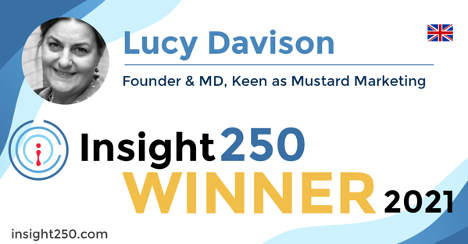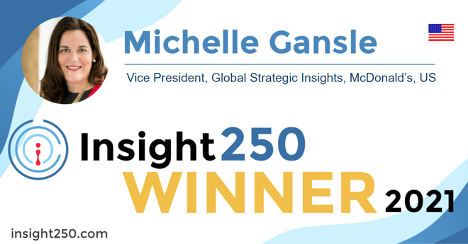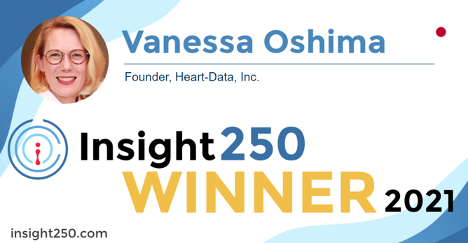Communicating insight with impact
Industry experts Michelle Gansle, Vanessa Oshima, and Lucy Davison provide you their powerful perspectives on how to make an impact through insights and deliver insights.

Article series
Insight250
- The importance of business sense in research
- The role of humour in effective leadership
- The importance of ethics
- The importance of disruption in innovation and leadership
- The importance of Disruption in Innovation and Leadership Part 2
- The importance of Diversity & Inclusion
- The impact of colour
- Communicating insight with impact
- Insights on leadership, culture and polling
- The evolution of electric vehicles
- 2022 Top tips (part 1)
- 2022 Top tips (part 2)
- Maximising the potential of data
- The importance of flexible working
- Winners
- The importance of advanced analytics
- Judges for the 2022 Insight250 Awards announced
- The evolution from social listening to digital intelligence
- The Judges' Perspective
- The judge's perspective - part 2
- Insight Climate Collective
- Insights technology
- Understanding employee ownership
- Global insight perspectives
- Top Tips from our Leaders and Innovators
- The Evolution of Insights in the Food & Beverage Market
- The Evolution of Insights in CPG
- Neural Mechanisms Behind Consumer Decision-Making
- Celebrating and Elevating the Insights Industry
- The State of the Insights Industry
- Opportunities, challenges and threats that AI presents
- 2024 Insight250 Winners Announcement
- Connecting Brands and Consumers Through Insights
- The Importance of Human Insight and Attention
- The Elevating Role of Insights with Technology Innovation
- Haleon’s Insight Expert on Consumer Healthcare
- Insight from the Insight250: How AI is Impacting Qualitative Research
- How AI Tech is Doing the ‘Heavy Lifting’ for Insights
- Reviewing the top tips for 2025
- Google's Sarah Ashley on AI and revolutionising insights - Insights from the Insight250
- Beyond BI: The Future of Decision Intelligence for Insight Professionals
- The Advancement & Impact of Insights - An Insight250 Winners Series perspective with David Smith
- International Jury for the 2025 Insight250 Awards Announced
- Newly elected President, Anne-Sophie, on Revolutionizing the Impact of Insights
- Haleon's Litthya Baez on Enhancing Healthcare with Insights - Insight250 Winners Series
- Understanding the Insights of Consumer Decisions
- Moving Beyond Dashboards to Deliver Decisions with AI
- How AI is Transforming Insights
- How AI is Transforming Insights
- Five Years of Insight250: Elevating the Insight Industry
The Insight250 spotlights and celebrates 250 of the world’s premier leaders and innovators in market research, consumer insights and data-driven marketing. The inaugural list was revealed this April and created renewed excitement across the industry whilst strengthening the connectivity of the market research community.
With so many exceptional professionals named to the Insight250 it seems fitting to tap into their expertise and unique perspectives across an array of topics. This weekly series does just that; inquiring about the expert perspectives of many of these individuals in a series of short topical features.
This edition features three industry leaders from across the globe. Michelle Gansle is Vice President of Global Strategic Insights for McDonald’s, US, Vanessa Oshima is the Founder of Heart-Data Inc. in Japan and Lucy Davison is the Founder and Managing Director of Keen as Mustard in the UK. I have long been a believer that a great insight that is not used because it is not effectively communicated, to the right audience, is not just a waste, but worse than not having an insight at all …These experts provide their powerful perspectives on how to make an impact through insights and deliver insights through their eclectic professional experiences and backgrounds.
In what way has the challenge of insights communications got harder?
Digitalisation and the increasing expectation of having everything on demand, has impacted us in our personal lives as well as in our ‘work lives’. Timelines for deliverables are speeding up and competition for people’s attention at work is increasing as well. That means our insights stories need to be not only true, but short, relevant and attention catching. We need to be more like journalists than novelists.
Michelle Gansle
My impression is that it is indeed getting harder as more and more clients come to us asking for help in this area. The problem they have is an excess of data and insights – organisations have ‘infobesity’. They are really challenged with getting that data and insights into the hearts and minds of their stakeholders - and with more data, the situation is getting worse. People talk about data democracy, and a lot has been spent on technology - knowledge sharing platforms, data platforms and dashboards – but tech does not solve the problem; getting people to engage with the data and platforms is a big challenge. Everyone has been trained on storytelling, but again this does not solve the problem - the most beautifully designed and structured report is still irrelevant if no one reads it. The challenge for insights communicators is getting awareness, understanding and engagement with the work that we do and the more data, the bigger the problem.
Lucy Davison
As Lucy has pointed out we are no longer having to create data through designing surveys and collecting data. Consumers, customers, and society are generating data for us every day creating large data lakes. And the speed with which data is created is demanding greater speed from the insights and strategy teams to find the connections quickly and to ensure that they are actionable insights – not just “interesting”. This means we need to ensure our partners know our business goals and the challenges/opportunities we are seeking the answer to. This will require our various functions and partners to collaborate with each other. Insight communication is becoming harder as the data is no longer controlled by one team in one function. It is everywhere – with your sns team, with your customer call centre, with your APP team, with your membership team, with the POS data/sales team and yes with your research and insights team. Insights will become action when they are solving real challenges and opportunities. And our biggest challenge is ensuring we are creating insights that lead to action and impact. We do that by spending enough time to understand the business we are working on – business insight combined with consumer insight, competitive insight, technological insights, government regulation insights.
Vanessa Oshima
How have you addressed these challenges - what worked well and what didn’t work as well?
I would say this wouldn’t I, but it is always incredibly helpful to our clients to be able to step back from the situation and get an external perspective. We have benchmarks for insights communications, plus it also saves a lot of time as we are not bogged down in the politics and day to day challenges so we can ‘cut to the chase’. And then it works best if you define and focus on your core purpose and keep coming back to that. We have the most impact when we have worked with a client to identify a clear and singular strategic purpose and then apply the marketing tools and techniques we would use for external marketing to the marketing insights internally.
Lucy Davison
We are introducing common processes and steps to the way that we include insight communication into our planning, strategy and execution. We call it the D-I-G process. Discover – Ideate- Go. We are also internally and externally generating understanding of the process and where we are in the process. We also have a 10 step assessment process that helps to know when and how to apply the insights. What has worked well is getting clear identification of the problem we are trying to solve for and why that matters to the stakeholders – what is their thinking and biases. Doing general insight work on a broad topic like “sustainability” without a clear understanding of how the insight will be used, the stakeholder expectations or point of view or the timeframe it needs to be applied etc has led to insight being successfully delivered and considered interesting but not fully applied. The question we ask ourselves at the beginning is not “what is our hypothesis”…but what does success look like? How will research/insight help us deliver that?
Vanessa Oshima
I think it’s still a journey, but we are working on it in multiple ways 1) using partners that can get us answers quicker, 2) using external partners – and upskilling ourselves – to be more savvy communicators using storytelling techniques and a wider variety of communication vehicles (beyond just a PPT presentation) and 3) focusing on spending less time on insights generation and more time on embedding those insights to incite business action.
Michelle Gansle
Vanessa, do you find big differences in the approaches taken in Japan, Europe and the US?
Increasingly the approaches that are taken are now converging as the barriers are being broken down across countries. In the research teams that I have worked with and led in Japan we have placed a greater deal on projective techniques to try to unlock the real opinions and meanings. Japan’s research tends to be much more structured and with a desire to answer direct questions in a clear linear way. When writing reports I find a larger difference is that Japan takes you on a journey of insights that finally lead you to the conclusion, whereas in reports from Europe and the US we will often start with this conclusion/findings and here is why that is true.
Vanessa Oshima
What do you feel are the most important skills for the next generation of insight professionals?
At both Mars and now at McDonald’s I have been a part of a consortium of brands called the Insights Alliance, led by PepsiCo and Zappi. Last year we put together an eBook to address just this topic. In short, the most important skills will be learning to go from supporting marketing to partnering across the business, focus on influence and impact (vs research project management), having more diversity and cross-field expertise and understanding in the team and being ‘tech forward; - we don’t need to be tech experts, but we do need to be comfortable enough with it to be able to apply and utilise appropriately.
Michelle Gansle
I tend to look at it from a different angle…rather than saying what are the important skills for the next generation of insight professionals, I am thinking more about how we make insights skills a foundational part of every person's toolbox. I think it will be a little like the fundamentals of running, throwing and jumping are key to most sports. So the insights skills of understanding how to clean and interpret data, to apply data and discovery to business questions.
For insights professionals the ability to transform “data and insight” to meaningful design briefs and action plans is key and I have encouraged my teams to:
Have business acumen so that we know how our work can impact the business.
Be curious about advances in technology – we do not need to be experts, but we should be aware of what is possible.
Have flexibility in communication styles. The goal is to ensure the message is understood, this may mean the same insight needs to be packaged and presented one way to the Finance team and another way to the creative design team.
Vanessa Oshima
I’d like to see more people from a design and journalism background in research. Communication skills come in all forms – design, data visualisation, copywriting, using different media such as video, animations and of course storytelling – these are all important. But it could just be a simple thing like writing subject lines on emails - remember the average office worker receives around 140+ emails a day. Reaching your target effectively depends on a powerful subject-line to wade through all of the noise. You wouldn’t whisper to someone in a crowd, so why would you whisper into their inbox?
Lucy Davison
I love that Lucy, “You wouldn’t whisper in a crowd so why whisper in an inbox”. Vanessa, how do you see insights teams get internal impact with insights?
Impact is made when we are solving problems and unlocking opportunities that matter. When we’re aligning projects to strategic plans and visions. Or when we’re making life easier – tools and insights that simplify the decision making process. When insights teams are seen as the objective voice of the market or consumer we have the most impact.
Vanessa Oshima
Lucy, do you see a trend for enterprises to seek more support from external agencies with communications challenges or is more being done in-house…what’s the right balance?
We are seeing more people look to communications agencies for their insight communications, as I said, it always helps to get fresh, unbiased eyes on the situation. It helps if those eyes are not the incumbent research agency – they are just as buried in the project and the data as the client and often struggle to get to the strategic purpose for a team beyond individual projects. Plus they do not have the communication skills to create the materials needed. To balance out the external agency ‘fixing’ your internal comms (if you will) we love to have a client-side champion who can drive things at a strategic level, and then preferably a ‘do-er’ - someone more junior with the skills, time (and interest) to focus on getting impact from insights.
Lucy Davison
Michelle, chocolate or chips - what’s easiest to research and why?
Ha! They are both equally fun to research. Anything that gets ingested is both a physical and often an emotional experience and therefore endlessly fascinating.
Michelle Gansle
We have seen many industries and brands lead, only to then become irrelevant or disappear. What do you think is key to longevity for the industry?
The need for understanding of consumers will continue to be important, this end goal will not change. The way that we do it will continue to evolve. We have already been through this with the shift from paper, field test questionnaires to internet surveys, from back room watching of focus groups to zoom meetings in the consumer's home. Key will be to remember the end goal – and not get tied to the methodology as technology and the environment changes. We should ask ourselves – how will we better understand our consumers? How will we better serve business questions?
Vanessa Oshima
HOT TOPIC: Ethics
In recent months some of the world’s leading corporations have come under fire for putting profits before responsible behaviour. What role do you feel the insight professional has in this space and do professional standards and codes of conduct play a part?
It is everyone’s role to stand up to irresponsible behaviour, whether you’re in insights or further afield. Organisations that put profits before responsible behaviour will suffer in the long-term as customers reject them. Insights professionals are effectively the voice of the customer within the wider organisation. We have an imperative to not only collect and disseminate data in an ethical way (which is why professional standards and codes are so important) but also to speak up for the consumer and provide an ethical compass for companies.
Lucy Davison
I think it is our role to be the voice of the consumer and raise up concerns and risks, but I do not think we should get into the space of governing or policing our businesses.
Michelle Gansle
The voice of Wall Street vs. the voice of the consumers. As we have seen there is an increasing shift from “buying products and services” to “buying from a company that aligns with my worldview” The insights industry will increasingly be asked to understand and unlock sentiment towards companies. However, more importantly we will be entrusted with access to data that customers and companies must feel will be safe and used in ways that are respectful of rights. This will be the role of professional standards and organisations such as ESOMAR to help provide reassurance or responsible behaviour.
Vanessa Oshima
TOP TIPS
Finally, what would your top-tips be for readers?
Go to conferences, network with peers outside of your company and take time to take the occasional supplier partner call to continue to upskill yourself in what’s new in the industry.
Michelle Gansle
Stay curious – as Clint Eastewood once said …if you think you know everything you are done. You are either repetitive, boring or both.
Vanessa Oshima
Define and communicate your purpose, upskill and invest in getting impact.
Lucy Davison
Thank you Michelle, Lucy and Vanessa – truly fascinating views from the US, the UK and Japan and some great tips on how we can all communicate our insights with greater impact. Thank you.
Remember that nominations for the 2022 Insight250 Awards are now open and you can select those you see as innovators and leaders at www.insight250.com

Lucy is the Founder and Managing Director of Keen as Mustard Marketing with over 30 years of experience in B2B marketing, strategy and communications. She is a sought after keynote speaker and has written extensively for The Financial Times, The Independent, Marketing Week and Retail Week and judged the AQR and Market Research Awards. She is also a former Council Member of ESOMAR.

Michelle Gansle is an international insights wave maker, with over 20 years in the Insights industry, mostly focused in consumer packaged goods industry. Michelle is currently leading Foresight, Innovation & Insights Strategy at Mars Wrigley, where she has the privilege of talking to people about gum and candy for a living. Michelle is a sought out speaker and has a passion for Diversity & Inclusion, the changing role of the Insights professional and collaboration between corporate researchers and client partners.
Prior to living in Chicago, Michelle had the opportunity to live and work in Europe for 4 years (und spricht Deutsch und een beetje nederlands y español!.) In her free time, Michelle loves music, travelling the world, and checking out new restaurants. She hopes to get to 100+ countries before she dies.

Vanessa is a marketing and brand strategist that is known for her strong passion for the end to end process of brand building and the role brands play in people’s lives. Her career has seen her work in insights and strategy teams, marketing and general management roles in Japan for some of the world’s most recognizable brands; Coca-Cola, Philip Morris and Nike and Starbucks. Vanessa joined ESOMAR in 2004, presenting a paper on the potential of wireless surveys to change research – this was the start of the drive of future proofing our approaches (embracing tech), brands and industry.
Vanessa is constantly seeking to understand using a simple process of what do I know - so what does that mean – now what do I do? This has guided her to finding actionable insights and insight/data verified opportunities. In 2017, she founded heart-data inc, a marketing strategy company focused on putting the consumer at the heart of the data, and creating strategies that are future proofing brands . In 2018, Vanessa was the co-winner of the ESOMAR paper of the year for her work on brand ikigai (unpacking brand longevity and loyalty). Vanessa is also a cancer survivor that works to raise awareness of cancer as part of life – that will not hold you back.
Crispin Beale
Chairman at QuMind, CEO at Insight250, Senior Strategic Advisor at mTab, CEO at IDXCrispin Beale is a marketing, data and customer experience expert. Crispin spent over a decade on the Executive Management Board of Chime Communications as Group CEO of leading brands such as Opinion Leader, Brand Democracy, Facts International and Watermelon. Prior to this Crispin held senior marketing and insight roles at BT, Royal Mail Group and Dixons. Crispin originally qualified as a chartered accountant and moved into management consultancy with Coopers & Lybrand (PwC). Crispin has been a Board Director (and Chairman) of the MRS for nearly 20 years and UK ESOMAR Representative for c15 years. As well as being CEO of Insight250, Crispin is currently Worldwide CEO of Digital Communications Solution Agency, IDX. Crispin is also the Senior Strategic Advisor at mTab and the Chairman of QuMind and spent 4 years as Group President of Behaviorally where he was responsibile for the client & commercial teams globally. Crispin is a passionate advocate for blending human intelligence and technology to deliver innovation and leadership across organisations.
Article series
Insight250
- The importance of business sense in research
- The role of humour in effective leadership
- The importance of ethics
- The importance of disruption in innovation and leadership
- The importance of Disruption in Innovation and Leadership Part 2
- The importance of Diversity & Inclusion
- The impact of colour
- Communicating insight with impact
- Insights on leadership, culture and polling
- The evolution of electric vehicles
- 2022 Top tips (part 1)
- 2022 Top tips (part 2)
- Maximising the potential of data
- The importance of flexible working
- Winners
- The importance of advanced analytics
- Judges for the 2022 Insight250 Awards announced
- The evolution from social listening to digital intelligence
- The Judges' Perspective
- The judge's perspective - part 2
- Insight Climate Collective
- Insights technology
- Understanding employee ownership
- Global insight perspectives
- Top Tips from our Leaders and Innovators
- The Evolution of Insights in the Food & Beverage Market
- The Evolution of Insights in CPG
- Neural Mechanisms Behind Consumer Decision-Making
- Celebrating and Elevating the Insights Industry
- The State of the Insights Industry
- Opportunities, challenges and threats that AI presents
- 2024 Insight250 Winners Announcement
- Connecting Brands and Consumers Through Insights
- The Importance of Human Insight and Attention
- The Elevating Role of Insights with Technology Innovation
- Haleon’s Insight Expert on Consumer Healthcare
- Insight from the Insight250: How AI is Impacting Qualitative Research
- How AI Tech is Doing the ‘Heavy Lifting’ for Insights
- Reviewing the top tips for 2025
- Google's Sarah Ashley on AI and revolutionising insights - Insights from the Insight250
- Beyond BI: The Future of Decision Intelligence for Insight Professionals
- The Advancement & Impact of Insights - An Insight250 Winners Series perspective with David Smith
- International Jury for the 2025 Insight250 Awards Announced
- Newly elected President, Anne-Sophie, on Revolutionizing the Impact of Insights
- Haleon's Litthya Baez on Enhancing Healthcare with Insights - Insight250 Winners Series
- Understanding the Insights of Consumer Decisions
- Moving Beyond Dashboards to Deliver Decisions with AI
- How AI is Transforming Insights
- How AI is Transforming Insights
- Five Years of Insight250: Elevating the Insight Industry


